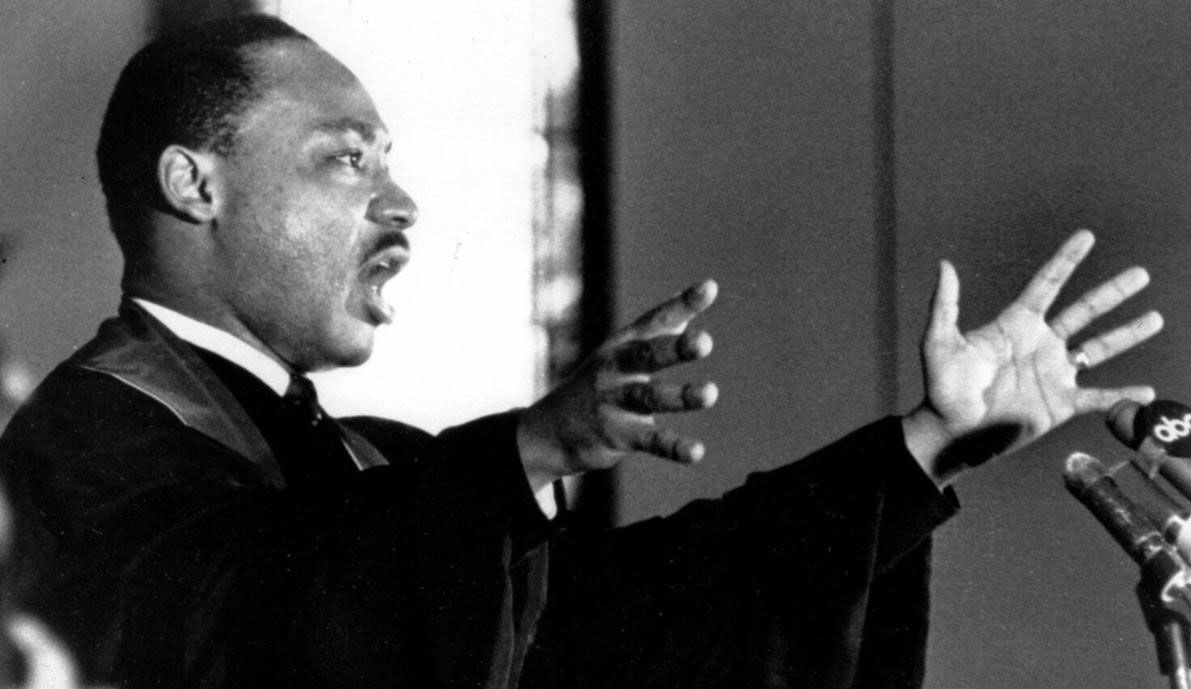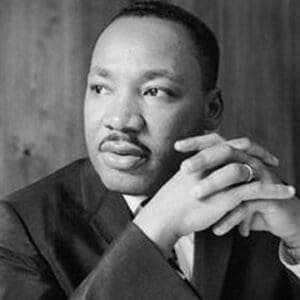Array
(
[0] => 60761
)
book: [Array
(
[0] => 60761
)
] (reading_id: 72992)bbook_id: 60761
The bbook_id [60761] is already in the array.
No update needed for sermon_bbooks.

Dr. Martin Luther King, Jr. preaching
’From today’s epistle, “God is faithful; by him you were called into the fellowship of his Son, Jesus Christ our Lord.” This is how Paul opens his first letter to the Church in Corinth – a Church community that at one and the same time was a powerful expression of the transformative life in Christ, but also where its emerging liturgical life reinforced socioeconomic division. On the one hand, the Corinthian Church was extraordinarily radical; it was multi-ethnic, and formed of people from across society, including enslaved people and those whom Paul describes as being of ‘noble birth.’ On the other hand, Paul was horrified to discover that, when the eucharist was celebrated in large houses, those lower classes, including slaves, were left in the narthex of the house, while the rich and the influential took their accustomed place in the dining room, lounging and feasting in their agape meal, or love feast. I guess, if you want to put that in the context of Saint Thomas Church, it’s like having all the leadership pledgers sitting in choir, and those struggling financially kept in near the Fifth Avenue Doors.
Our fellowship with Jesus Christ is at the heart of our faith journey; it is, therefore, at the heart of what it is to be a Christian community. Our churches are to be characterized by a life lived in union with Jesus Christ – they are to be radical examples to the secular world of how societies should behave, with all peoples’ lives enriched, living together in harmony, with equal opportunity for access to education, housing, and health care.
Tomorrow is Martin Luther King Day, and it comes soon after Christmas, in the season of Epiphany – a season when we think of the glory of God revealed in Jesus – and a season when we read again Paul’s letters to a multi-ethnic and socially diverse church, yet one struggling with social convention, class, and status.
It has often been commented that the images on the great reredos are predominantly male and white, as is the case with most of the other images in the Church. So, it is surely no coincidence that in the 1960s, during the civil rights’ movement, that the Vestry decided to carve new images of people whom the Rector, Dr. Morris, described as ‘emancipators,’ including two statues of black Americans – Mary McLeod Bethune, who dedicated her life to racial and gender equality particularly through education; and Martin Luther King Jr. whose prophetic witness is honored not only in the churches, but by people all over the world.
Now, in case you think this is a woke sermon, some of you will be mightily disappointed, because I don’t think we should be a woke church. Why? Because all too often I hear words and debate and political correction that does nothing to actually change things. Paul said, “God is faithful; by him you were called into the fellowship of his Son, Jesus Christ our Lord.” Thus, our common life should always be counter—cultural, inclusive, and welcoming of all; where power and prejudice are challenged; where love casts out hatred and fear because that is at the heart of our Baptismal Covenant, that ends with the promise “to respect the dignity of every human being.”
All too often, however, our communities of faith fail to live out that calling. All too often, as we know from history, Christians and the Christian churches have failed to show the world the liberating love of Jesus Christ, interested only in debate rather than action; highlighting what divides rather than what unites.
I remember when I was a seminarian, in Oxford, our Pastoral studies tutor held a gathering in his home with a black church worker from Haiti. It was moving to hear her describe the conditions in which she worked, and about the faithfulness of her church. When she finished speaking, I said to her “What can we do to help you?” She looked me in the eye and said, “Why do you always ask what you can do for us, instead of asking me what we can do for you?” I lived in a warm and safe community, set in the midst of a beautiful university, where I was provided with three cooked meals a day, and I didn’t even have to clean my room. We were a group of men, mainly white, who yes, wanted to help, but who from our position of privilege had also kept ourselves aloof from the reality of what she had just described; if we were honest, most of us would not choose to swap the sight of the dreaming spires of Oxford for a home in Haiti, (though here I should recognize our own Fr. David McNeeley who, as a young doctor, did exactly that). It was a wake-up call, and I realized that for the rest of my life what mattered was not carefully worded statements, but rather, a change in me – a change in my attitudes and also my actions. In this Christmas and Epiphany season, we celebrate the Word made flesh, but it is all too easy for us to turn the Word back into mere words. As we read in the Letter to the Hebrews, “the word of God is living and active.” (Hebrews 4:12a)
Our faith is based on telling a story and, more importantly, knowing and living that story. I think that is why is there so much history in the Bible; it is important to know our past, including when things have gone wrong.
I remember when I worked in a medieval cathedral in England, that contained many beautifully adorned tombs. There were several knights’ effigies dressed in their armor, with heraldic devices and lions as supporters. Now, near the cathedral, was a Church of England school. It was a typical inner-city Church School, whose life was centered on the Christian tradition and worship, and yet had large numbers of children from the Muslim community. Each year, classes would come and visit the cathedral and they would invariably be drawn to the knight’s effigies. We would chat about them, and then a child always asked the question I was dreading, “Sir, why are the knight’s legs crossed?” (Because several of the knights were lying down with their legs crossed, rather as if they were a teenager lazing on the sofa watching TV). “Ah, good question,” I would say, “They went on the crusades.” After a pause came the next question…“What is a crusade?” Knowing our history and where we have been, in bad times as well as good, is important for all of us, as much as how we live our lives.
Some words of Dr. King, “The end is reconciliation; the end is redemption; the end is the creation of the beloved community. It is this type of spirit and this type of love that can transform opposers into friends…It is an overflowing love which seeks nothing in return. It is the love of God working in the lives of men. This is the love that may well be the salvation of our civilization.” [1]
Sermon Audio
References
| ↑1 | from “The Role of the Church in Facing the Nation’s Chief Moral Dilemma,” 1957 |
|---|


 Almighty God, by the hand of Moses your servant you led your people out of slavery, and made them free at last: Grant that your church, following the example of your prophet Martin Luther King, may resist oppression in the name of your love, and may strive to secure for all your children the blessed liberty of the Gospel of Jesus Christ; who lives and reigns with you and the Holy Spirit, one God, now and for ever. Amen.
Almighty God, by the hand of Moses your servant you led your people out of slavery, and made them free at last: Grant that your church, following the example of your prophet Martin Luther King, may resist oppression in the name of your love, and may strive to secure for all your children the blessed liberty of the Gospel of Jesus Christ; who lives and reigns with you and the Holy Spirit, one God, now and for ever. Amen.